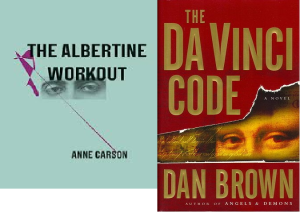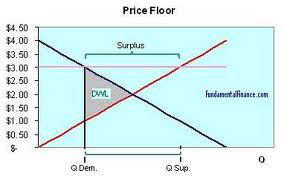This post is mostly about Anne Carson’s “The Albertine Workout.” It is mostly a stretch of thinking-through of the connections between power, servitude, information, and expectations. The text, unfortunately without the appendices, can be found here: http://www.lrb.co.uk/v36/n11/anne-carson/the-albertine-workout
One appendix to the poem pretends to explain the difference between metaphor and metonymy with a a nonsensical parable: Children asked to explain “a hut” respond with either “a small cabin” or “it burned down.” One of these, it would appear, should exemplify metaphor; the other, metonymy.
As one who stakes some portion of their self-esteem both on knowing this difference and on being able to parse difficult sentences, I was frustrated and halted by this parable: “This does not make sense.”
When I turned the page, seeking distraction or clarification, I found absolution of a different kind– Anne Carson apologizing for ‘letting the previous appendix get away from her.’ Obviously, the parable didn’t explain the difference between metaphor and metonymy at all.
In some daringly platitudinous phrase, Anne Carson forgives herself for getting sidetracked. Something like, “It’s natural, whenever one undertakes the ‘crazy adventure of thinking.'” (i read the book in the bookstore because I am poor, but now I am paying for it with not being able to access the appendices.)
At this point, I’m beginning abstract wildly, articulating the associations and oppositions Anne Carson seems to be suggesting: “charming digressiveness, distractibility associated with ‘adventure of thinking’; this in opposition to meeting expectations, definite knowledge.” And my malcontent mind takes this from the sphere of the text, appends to the latter set: “rational expectations, customer feedback cards: ‘meets expectations, exceeds expectations, does not meet expectations’
The title of the poem, “The Albertine Workout,” taken as if from a tabloid headline, conspicuously does not deliver on its promise. (Albertine, we are told, is always asleep.) The volume is a work of charming disobedience, like a precocious child you are glad does not always behave as directed. Albertine, the poem’s namesake, is a character in a Proust novel, probably based on Proust’s chauffeur. She is a servant to the narrator-character, probably based on Proust. The Proust volume is called La Prisonnière in French and The Captive in English. Here is a stretch of text that I am not making much of an effort to truncate. (I am: 1) charmingly digressive 2) unindustrious poor)
8. The problems of Albertine are (from the narrator’s point of view) a) lying b) lesbianism, and (from Albertine’s point of view) a) being imprisoned in the narrator’s house.
9. Her bad taste in music, although several times remarked on, is not a problem.
10. Albertine does not call the narrator by his name anywhere in the novel. Nor does anyone else. The narrator hints that his first name might be the same first name as that of the author of the novel, i.e. Marcel. Let’s go with that.
11. Albertine denies she is a lesbian when Marcel questions her.
12. Her friends are all lesbians.
13. Her denials fascinate him.
14. Her friends fascinate him too, especially by their contrast with his friends, who are gay but very closeted. Her friends ‘parade themselves’ at the beach and kiss in restaurants.
15. Despite intense and assiduous questioning, Marcel cannot discover what exactly it is that women do together (‘this palpitating specificity of female pleasure’).
16. Albertine says she does not know.
17. Once Albertine has been imprisoned by Marcel in his house, his feelings change. It was her freedom that first attracted him, the way the wind billowed in her garments. This attraction is now replaced by a feeling of ennui (boredom). She becomes, as he says, a ‘heavy slave’.
18. This is predictable, given Marcel’s theory of desire, which equates possession of another person with erasure of the otherness of her mind, while at the same time positing otherness as what makes another person desirable.
The continuations of the above interpretative key may be fairly apparent: Possession, a meeting-of-expectations (customer feedback card, the purchases of the rational consumer), itself destroys desire in the senses of “wind-billowed garments” or “palpitating specificity,” which is contingent on otherness. Possession, then, is opposed to desirability, which we can align with Anne Carson’s non sequiturs, ‘the adventure of thinking’, or “free” sexuality. As soon as we have these things, they cease to exist. I don’t think much of this is groundbreaking so much as it may be relevant. I have in mind the generally misogynistic discourse of “sexual obligation” which converts desirability to the meeting-of-expectations. One can picture the resigned intercourse of the ‘heavy slave,’ the eventual consummation of what “might as well” happen. The paradigm of passion or discovery is displaced by the bored reenactment of inherited expectations, like losing your virginity at prom.
But even this may be a best-case scenario, as such visible examples as that mass murderer whose name i forget might attest. He didn’t “get” what he was “owed” from women who were “less attractive” than him, and exploded with jealousy. Paradigms of exchange, possession, and knowable value were used as an analogy for human sexualities, and when reality didn’t meet expectations, he responded with violence.
But similar sorts of violence may be deeply and innocuously embedded in our social fabric, and not only with regard to issues of gender and sexuality. Take, as an example, people who work in retail or customer service (the “servant class.”) Take, if you want, employment as such. To extend slightly from the text quoted above:
19. And in point of fact, how can he possess her mind if she is a lesbian?
20. His fascination continues.
21. Albertine is a girl in a flat sports cap pushing her bicycle across the beach when Marcel first sees her. He keeps going back to this image.
22. Albertine has no family, profession or prospects. She is soon installed in Marcel’s house. There she has a separate bedroom. He emphasises that she is nonetheless an ‘obedient’ person. (See above on Albertine as a ‘heavy slave’.)
Albertine’s human connections are stripped from her. I’m reminded of David Graeber’s argument in ‘Debt’ that slaves had to be stripped from their ‘context’ before they could be made slaves, hence the breaking up of families, the necessary forced migrations, etc. Hence Albertine is turned into a servant by her lack of context. But to the degree that she is a servant, Marcel becomes bored. His fascination for her remains only insofar as she isn’t obedient (she lies), or only insofar as she still has a human context (Marcel imagining her with her lesbian friends.) Her value is inversely proportionate to the degree that she is possessed. Similarly, the unhumanity of the servant class is something of an unhappy cliché.
Take, as point of contrast: Anne Carson, as a poet, is permitted the relatively unalienated work of writing (her time is not controlled enough, or her work is not possessed enough, either by consumer or employer.) She is free to offer an ‘Albertine workout,’ or a parable to differentiate metaphor and metonymy, and then to simply not deliver. But, by virtue of her not delivering, we gain are able to interact with something else entirely, which ends up being much more interesting and valuable. Like Oscar Wilde says of the soul of man under socialism, “It will not be always meddling with others, or asking them to be like itself. It will love them because they will be different. And yet while it will not meddle with others, it will help all, as a beautiful thing helps us, by being what it is.”
To return then, to the servant class, we see a collective possession of work-time by our greater economic system. The entitled consumer of other people’s time demands their expectations are met, but to the extent that they are, the possibility for enrichment and sociality is stripped from (not only) their lives. The obligation– to have sex, dispense coffee, fulfill expectations– is there, but in being an obligation, it is already, not free exchange, but a demeaned product of violence. The charming unexpectedness of the child at play gives way to obsequiousness and the need to please. “Give us what we are owed,” we say, and human lives are given socioeconomic justification to the extent that they satisfy demands or fulfill expectations– but, like Albertine, they are also rendered worthless to the extent that they do so.
It’s on my sociopolitical wishlist to see a discourse of ‘producer choice’ (or, better yet– ‘friendship,’ or ‘respect’) emerge alongside or instead of the already-popular ‘consumer choice.’
—
It’d maybe be a little bit funny, to not talk about Dan Brown in this post, but I’ll do so quickly, to expand the hermeneutic fleshed out above in another direction.
“What is it that hides behind the old masterpieces?” asks Dan Brown, and sets out to deliver exactly that.
Anne Carson asks the same question, but finds it already answered.
And of course, poetics / aesthetics cannot be definitively translated to an *answer* in any definite and meaningful way, so Dan Brown must forge a conspiratorial fantasy– which may retain elements of thoughtfulness or intrigue, but which, ultimately, becomes a “pornography of deduction:” false-to-life and coming to a definite end (spoiler alert: the narrator has sex with the holy grail.) The invented mystery behind the mona lisa is male frustration with female elusiveness. In rendering it knowable, it also renders it boring– by the epilogue, there is nothing more to be said.
Consider in contrast the numerated (stanzas? blocks?) of ‘The Albertine Workout,’ or the numerated but non-sequential appendices. The poem parodies the forms of the encyclopedia or deductive reasoning, both of which would offer a mode of knowledge conveyance metaphysically similar to “meeting expectations.” Dan Brown’s “mystery delivery” follows the logic of these forms (the information dumps, the linear unraveling) if not their structures, which recede into the background but still provide the basis for the violence that occurs, of rendering something knowable, making it “meet expectations.”



